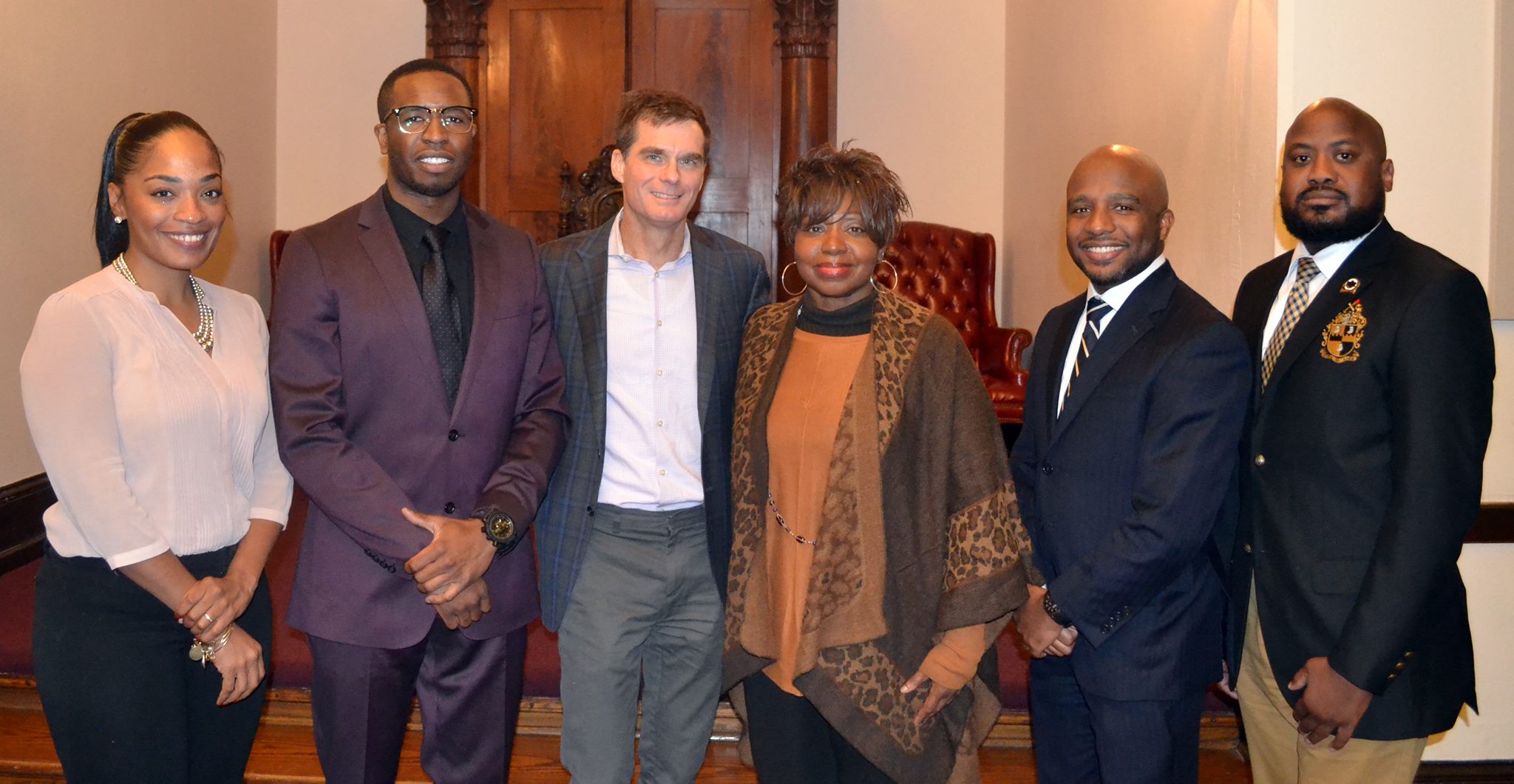
Penn Memory Center Coordinator for Multicultural Recruitment and Retention Karletta Poland (left), PMC Co-Director Jason Karlawish (center left), and PMC ambassador Karen Wheeler (center right) pose with Alpha Phi Alpha brothers after “Alzheimer’s in our Community.”
By Joyce Lee
A recent event co-hosted by the Penn Memory Center and the African-American fraternity Alpha Phi Alpha (APA) called on local communities to address the growing problem of Alzheimer’s disease in the African-American population. The event, titled “Alzheimer’s In Our Community: A Call to Action,” focused on education, training, and research initiatives needed to combat this disease within this demographic group.
APA member Frederick Okoye III pointed out the high mortality rate and prevalence of Alzheimer’s disease as his motivation for hosting the event.
“The most striking statistic for me, however, was the disparity in diagnosis, treatment, and the general knowledge of cognitive impairment in communities of color, particularly African-American communities,” Okoye said.
Older African-Americans are twice as likely to develop Alzheimer’s disease or other dementias as older white, non-Hispanic Americans, the Alzheimer’s Association reported in its 2017 Alzheimer’s Disease Facts and Figures.
One of the problems contributing to this disparity is the lack of awareness of Alzheimer’s disease and other dementias within African-American communities. Guest speaker Karen Wheeler, speaking about her experience caring for her mother, who had Alzheimer’s disease, said: “No one around me that I knew of at the time had Alzheimer’s disease. The only two people I knew [who] had Alzheimer’s disease were former president Ronald Reagan…and the actress Rita Hayworth, and I only knew about that because I read the article in a fashion magazine.”
Lack of awareness, though, can often be exacerbated by inadequate care. More than half of Americans whose doctor had diagnosed them with Alzheimer’s disease did not know they had Alzheimer’s disease – or what they were told was so ambiguous that they weren’t sure what their actual diagnosis was.
“What this reflects is how bad the care is out there – and it’s not bad by any malicious intent,” PMC Co-Director Dr. Jason Karlawish said. “It’s just we didn’t invest as a nation in training doctors to take care of older adults, especially older adults with cognitive problems.”
Lack of awareness can also in turn lead to a lack of representation in much-needed research studies that examine care and treatment options for those with the disease.
For example, the Alzheimer’s Disease Neuroimaging Initiative, a national study that has a site at PMC, collects brain scans, blood samples, and cerebrospinal fluid from patients with Alzheimer’s disease, mild cognitive impairment, and normal cognition. But “you can count on about two hands the number of African-Americans in that study,” Dr. Karlawish said.
Dr. Karlawish, however, pointed out recent initiatives at PMC aimed at outreach, education, and training in Alzheimer’s disease in local communities of color.
One recent initiative was the creation of a position at PMC dedicated specifically to recruitment and retention of participants from underrepresented groups, particularly African-American participants, in research studies at PMC. Another initiative was the launch of a program seeking to provide opportunities for students from underrepresented minority groups to engage in research on cognitive aging, in recognition of the fact that training the workforce is critical to improving the outcomes of this population.
“About five years ago, our cohort had about a 10% African-American representation, and I said that’s unacceptable in a city that’s about 40% [African-American],” Dr. Karlawish said. “And we changed that. We now have about a 35% African-American representation.”
Wheeler mentioned how her mother was one of those African-American participants in research studies at PMC before she passed away, and she even planned on donating her brain for further investigation on the biological bases of Alzheimer’s disease. “[My mother] participated in the studies because she didn’t want other families to have to go through what we were going through,” Wheeler explained.
Similarly, Dr. Karlawish encouraged those in the audience to join the Brain Health Research Registry, a database of people to be contacted for participation in research studies on Alzheimer’s disease and related dementias at PMC. A more diverse research participant cohort means better diagnoses, treatments, and education for patients who develop Alzheimer’s disease and related dementias.
The consensus at the end of the APA event was that the entire community should share the burden of raising awareness, educating, and training on Alzheimer’s disease and dementia.
“We don’t want this to become the health situation the way that HIV did when we had an administration that ignored and didn’t talk about HIV for years, and many people died as a result,” Wheeler said. “We’re already had a situation like that once before, there’s no reason we should have a situation like this again, in terms of Alzheimer’s.”